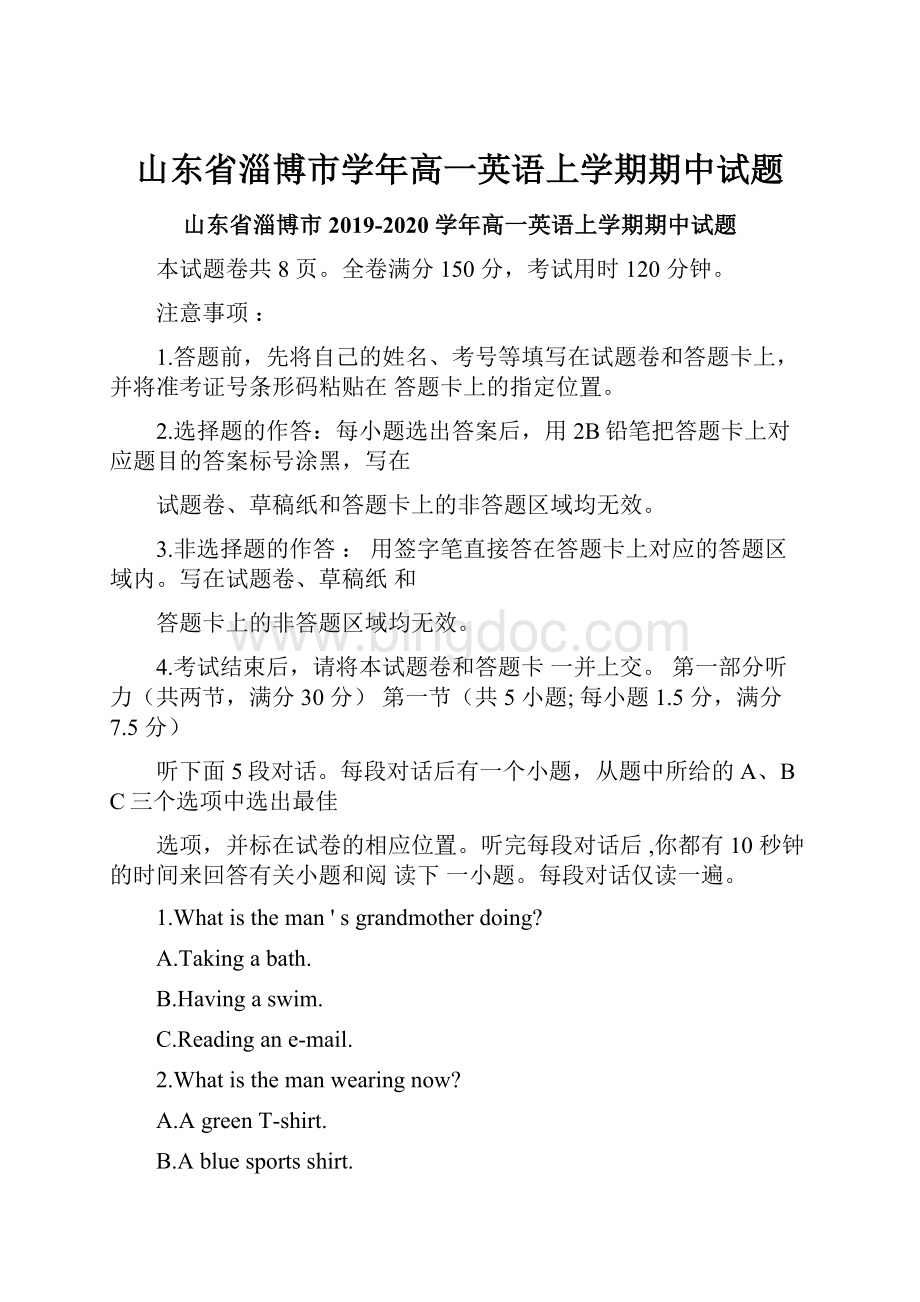山东省淄博市学年高一英语上学期期中试题.docx
《山东省淄博市学年高一英语上学期期中试题.docx》由会员分享,可在线阅读,更多相关《山东省淄博市学年高一英语上学期期中试题.docx(21页珍藏版)》请在冰点文库上搜索。

山东省淄博市学年高一英语上学期期中试题
山东省淄博市2019-2020学年高一英语上学期期中试题
本试题卷共8页。
全卷满分150分,考试用时120分钟。
注意事项:
1.答题前,先将自己的姓名、考号等填写在试题卷和答题卡上,并将准考证号条形码粘贴在答题卡上的指定位置。
2.选择题的作答:
每小题选出答案后,用2B铅笔把答题卡上对应题目的答案标号涂黑,写在
试题卷、草稿纸和答题卡上的非答题区域均无效。
3.非选择题的作答:
用签字笔直接答在答题卡上对应的答题区域内。
写在试题卷、草稿纸和
答题卡上的非答题区域均无效。
4.考试结束后,请将本试题卷和答题卡一并上交。
第一部分听力(共两节,满分30分)第一节(共5小题;每小题1.5分,满分7.5分)
听下面5段对话。
每段对话后有一个小题,从题中所给的A、BC三个选项中选出最佳
选项,并标在试卷的相应位置。
听完每段对话后,你都有10秒钟的时间来回答有关小题和阅读下一小题。
每段对话仅读一遍。
1.Whatistheman'sgrandmotherdoing?
A.Takingabath.
B.Havingaswim.
C.Readingane-mail.
2.Whatisthemanwearingnow?
A.AgreenT-shirt.
B.Abluesportsshirt.
C.Agreensportsshirt.
3.WhenwillthewomanbringtheiPadtotheman?
A.Thisafternoon.
B.Tomorrowmorning.
C.Tomorrowafternoon.
4.Wherewillthewomangofirst?
5.Whatarethespeakersmainlytalkingabout?
A.Afriend.B.Ahouse.C.Agarden.第二节(共15小题;每小题1.5分,满分22.5分)
听下面5段对话或独白。
每段对话或独白后有几个小题,从题中所给的A、BC三个选
项中选出最佳选项,并标在试卷的相应位置。
听每段对话或独白前,你将有时间阅读各个小题,每小题5秒钟;听完后,各小题将给出5秒钟的作答时间。
每段对话或独白读两遍。
听第6段材料,回答第6、7题。
6.Whenwillthemanseetheshow?
A.OnSaturdayevening.
B.OnTuesdayafternoon.
C.OnWednesdayevening.
7.Howmuchwillthemanpayforthetickets?
A.$8.B.$10.C.$16.
听第7段材料,回答第8、9题。
8.Whatisthewoman'shobby?
A.Playingcomputergames.
B.Collectingcoins.
C.Doingcycling.
9.Wholikesenteringcompetitions?
A.Steven.B.Ivan.C.Molly.听第8段材料,回答第10至12题。
10.Howmanypeoplewillcometotheparty?
A.7.B.ll.C.18.
11.Whathasthewomanpreparedfortheparty?
A.Herguitar.
B.HerCDplayer.
C.Hertaperecorder.
12.WhatpresenthasthewomanboughtforEmma?
A.Acamera.
B.Avideo.
C.Afootball.
听第9段材料,回答第13至16题。
13.Whichvegetablesdoesthewomanneed?
A.Carrotsandlettuce.
B.Lettuceandpeppers.
C.Carrotsandpeppers.
14.Howmanydegreesdoesthewomanfirstaskthemantoturnthecookeronto?
A.190degrees.
B.200degrees.
C.220degrees.
15.Howlongwillthedishtaketocook?
A.40minutes.B.25minutes.C.15minutes.
16.Whatwillthemandowhilethedishiscooking?
A.Dothewashing-up.
B.Makeadessert.
C.WatchTV.
听第10段材料,回答第17至20题。
17.WhatdoesMahado?
A.Adoctor.B.Anurse.C.Aworker.
18.WhatisthebookHardWorkabout?
A.Afilmstar.
B.Amanandhisson.
C.Adifficultjourney.
19.Whichbookiswrittenbyastudent?
A.HardWork.
B.TheLongNight.
C.HospitalorCinema.
20.WheredoesthestoryinHospitalorCinemahappenmostprobably?
A.InBritain.B.InAustralia.C.InThailand.
第二部分阅读理解(共两节,满分40分)
第一节(共15小题;每小题2分,满分30分)
阅读下列短文,从每题所给的AB、C和D四个选项中,选出最佳选项。
A
OTHeLANLEYSCHOOL
C.At9a.m.D.At10a.m.
Likeanynewninth-graderonthefirstdayofschool,JoemarClasshadninth-graderemotion(情绪).He'snotusedtoschoolinHartford.He'susedtogoingtoschoolinhishometownofFlorida,usedtoseeinghisfriends,usedtohavingclassinSpanish.
“Nervioso,”hesaidinSpanish.
WefirstmetJoemarinmid-OctoberintheSanJuanAirport.Hisfather,GuillermoClass,hadsoldhiscartobuyplaneticketstogethiskidsandflythemupfromPuertoRico.Theislandwasalmostdestroyed(毁坏)bythedeadlystorm一
HurricaneMaria.
Now,theyarewitlingintotheirnewhomeinHartford'sSouthEnd.Aweeklater,and,usinghiswife'scar,Classdrove16-year-oldJoemartohisFirstdayatBulkelryHighSchool.Afterashortride,hegotoutinfrontofhisnewschool.Inside,Inside,hemetGretchenLevitz-theschool'sprogramdirector.
“Iseeyouhaveanewuniform(校服),”Levitzsaid.“Youlookgreat.Areyou
readyforagoodfirstday?
”
Thenhemetacoupleofteachers.
“Hello,”theyeachsaidinSpanish.Theyaskedwherehe'sfrom,andtoldhimtheywerehappytoseehim.Then,Levitztookhimonaquicktouroftheschoolbeforeclassesbegan—toheroffice,theschoolstore,thelibrary,andthedininghall.
Atotalof19languagesarespokeninBulkeleyHighSchool.“Wehavesomany
newstudentscomingherefromothercountrieseverysingleday,”Levitzsaid.“So
it'snotlikehe'stheonlyonewhohasthatfeeling.”
“Youcouldtellhe'salittleworried,”Guillermosaidasweleft.“But,at
thesametime,he'slookingforwardtoit.”
24.WhatkindoffeelingdidJoemarhaveonhisfirstdayofschool?
A.Angry.B.Excited.C.Nervous.D.Relaxed.
25.WhydidJoemarleaveFlorida?
A.Histownwashitbyaterriblestorm.
B.Hisoldschoolcloseddown.
C.Hewantedtoseehismother.
D.Heexpectedtohaveanewlife.
26.WhatdidJoemardobeforehewalkedintohisnewclassroom?
A.Hehadalongtalkwithhisfather.
B.HelearnedsomesimpleSpanishwords.
C.Hesaidhellotosomeofhisclassmates.
D.Hehadashortlookaroundhisnewschool.
27.WhatcanwelearnaboutBulkeleyHighSchool?
A.Ithasnolibrary.
B.Itisaninternationalschool.
C.ItplanstoopenSpanishclasses.
D.Itrequiresallstudentstowearuniforms.
C
IdidsomeresearchandexaminedhowBritishEnglishandAmericanEnglishchangedbetweenthe1930sandthe2000s.Takespelling,forexample—towardsthe1960sit
lookedliketheUKwasgoinginthedirectionofnotusingthe“u”in“colour”
andwriting“centre”as“center”.Butsincethen,theBritishhavebecomemoreconfidentinsomeoftheirownspellings.Inthe2000s,theUKusedanAmericanspellingchoiceabout11%ofthetimewhileAmericansuseaBritishoneabout10%ofthetime.ThereisalsononeedtoworrytoomuchaboutAmericanwords,suchas14vaca-tion5J,“liquor”and“lawmaker”enteringBritishEnglish.ThereareafewexamplesofthiskindofvocabularychangebuttheyaremostlyuncommonwordsandarenotlikelytochangeBritishEnglishtoomuch.TheBritisharestillusing“mum”ratherthan“mom”and“petrol”ratherthan“gas”.
Butwhenwestartthinkingoflanguagemoreintermsofstylethanvocabularyorspelling,adifferentpictureappears.Someofthebiggertrends(趋势)inAmericanEnglisharemovingtowardsafreeruseoflanguage.Americansentencesareonaverage(平均)onewordshorterin2006thantheywerein1931.
Americansalsousealotmoreapostrophes(撇号)intheirwritingthantheyused
“don't”“Thehandoftheking”becomestheshorter“Theking'shand”.
However,inallthesewaysBritsarechangingtoo—andinthesamewayas
Americans.They'rejustabout30yearsbehindthetrendthatAmericansseemtobe
leading.
Sothisraisesaquestion,isBritishEnglishactivelyfollowingAmericanEnglishoristhissomethingthatissimplyanaturaltrendinlanguageuse?
PerhapstheBritishwouldhavegoneinthatdirectionevenifAmericahadneverbeendiscovered?
I'd
liketoagreewiththesecondideabutbecauseofthefactthatBritishpeoplelearnplentyofAmericanlanguagethroughdifferentways,Ithinkthefirstismorecorrect.
28.WhatdidtheBritishdointhe1960s?
A.TheyusedsomeAmericanspellings.
B.Theybuiltupconfidenceintheirlanguage.
C.Theydidresearchonlanguagedifferences.
D.Theywentinthedirectionofharderspellings.
29.Whatdoestheauthortrytoshowbyusingexampleslike“petrol”?
A.BritishEnglishhaschangedalot.
B.Someuncommonwordsareusedlessoften.
C.AmericanwordsareenteringBritishEnglish.
D.Americanspellingwon'tchangeBritishEnglishtoomuch.
30.WhichofthefollowingisatrendofAmericanEnglish?
A.Itisusingshorterwords.
B.Itisturningtopropergrammar.
C.Itistryingtomakesentencessimpler.
D.Itisavoidingusingapostrophes..
31.Whichofthefollowingistheauthor,sopinionaboutthelanguages?
A.AmericanEnglishisgoingthewrongway.
B.BritishEnglishisfollowingAmericanEnglish'sexample.
C.AmericanEnglishisborrowingalotfromBritishEnglish.
D.Languageswouldn'tchangemuchifAmericawasnotdiscovered.
ofmodemlife.Whatisit?
Graffiti(涂鸦),ofcourse.Lookaroundcitiesinthe
UKtodayandyoucanseegraffitionbuildings,walls-,doorsandevenonbusesortrainsthathavestayedinoneplacefortoolong.Butwheremodemtechnologycreatesaproblem,italsofindsawaytodealwithit.Lastweek,TheWeekendWestwassh(>wnaroundthefactoryofasmallbutsuccessfulcompany,Hubdean.
Hubdean'sachievementisaseriesofspecialpaintswhicharegraffiti-resistant.Howdotheywork?
Itcouldn'tbesimpler.Takeany
graffiti-coveredsurface.First,atreatmentcalledAgproclearisused.Then,usingaveryhotpressurejet(压力喷嘴),thistreatmentistakenawayandthegraffiti
disappearsatthesametime.Nowyouhaveacleanwall.Butbeforethiscleanwallcanbepaintedonbygraffitilovers,anewproduct,Agproshield,isused.Thispainthasaspecialsurfacewhichgivesittwoimportantadvantages.Firstly,spraypaint(喷雾颜料)won'tsticktothesurfaceverywell,andsecondly,thewholesurfacecanbecleanedveryeasily,justusingwater.Oncethesurfaceispainted,nospecialistequipmentisneededtokeeptheareacleanandgraffiti-free.
Notsurprisingly,HubdeansproductsareusedbybothlocalgovernmentsandprivatecompaniesallovertheUK,andnowordersarebeingreceivedfromaroundtheworld.Thisbringsthecompanyaproblem,however.Cantheyincreaseproductiontosatisfytheneeds?
Ofcourse,theycanbuildasecondfactoryorworkwithalargeinternationalcompanytomaketheirproducts.ThefutureislookinggoodforHubdean!
32.Whatdoestheunderlinedword“graffiti-resistant”inParagraph2mean?
A.Paintinggraffiti.B.Keepinggraffiti.
C.Preventinggraffiti.D.Changinggraffiti.
33.WhenshouldAgproshieldbeused?
A.BeforeAgproclearisused.
B.Whenthewallisstillclean.
C.WhenAgprocleardoesn'twork.
D.Aftergraffitiispaintedonthewall.
34.WhatcanwelearnaboutHubdean?
A.Thereisagoodmarketfo